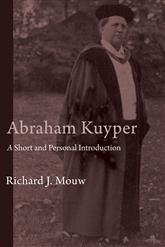
Why Kuyper? Richard Mouw’s Abraham Kuyper: A Short and Personal Introduction (Eerdmans, 2011), in part, seeks to answer that question. Kuyper, according to Mouw, asked many of the questions that should be central for the Reformed church.
The questions that motivated much of Kuyper’s thinking about how Christians are to serve the Lord in the broad reaches of culture [are] How are we to understand God’s intentions in creating the world and – in response to the human rebellion that thwarted God’s creating purposes – in sending the divine Son to reclaim the world that had been so corrupted by sin? (Mouw, 5)
The questions are still central, but the answers given by Kuyper have unfortunately seemed to fall by the wayside. The backlash against 20th century Liberalism has driven the Evangelical world into focusing on individual salvation. Although individual salvation is important, Kuyper maintains that this is not where the focus of Christianity should be. Kuyper is oft quoted as saying,
there is not a square inch in the whole domain of our human existence over which Christ, who is sovereign over all, does not cry “Mine!”. (4)

This cry is important due to the fact that it breaks us out of our individualism and shows us that we are not the lone recipients of a saving grace. Kuyper reminds us that God “incorporates us into a community, the people of God. And this community, in turn, is called to serve God’s goals in the larger world.” (5) What Kuyper is arguing here is that the church was established to fulfill what some have called the cultural mandate, which states that we should “Be fruitful and increase in number; fill the earth and subdue it.” (Gen. 1:28) Kuyper then further develops this thought to show that all Christians are called to Kingdom service, no matter what we do. All of humanity is to worship God and join their voices with the rocks that cry out. We do this by being obedient “caretakers in the cultural aspects of created life.” (7) We are to maintain the natural created order, for God laid down the structure of the world at the time of Creation.
Even though sin has perverted (and broken) the natural order, it is not to be thrown away. Kuyper asks us, “Can we imagine that at one time God willed to rule things in a certain moral order, but that now, in Christ, He wills to rule it otherwise?” (14) Scrapping the moral and natural order of the world would go against the revealed will of God, in Kuyper’s mind. According to Kuyper, nothing new happened with Christ’s death. What did happen is that “Christ has swept away the dust with which man’s sinful limitations had covered up this world-order, and has made it glitter again in its original brilliancy.” (14) Kuyper describes the Cross this way to make clear the difference between Creator and Creation. Furthermore, Kuyper does not want us to confuse creation and redemption. Creation has already happened; redemption is on going. What is our role in the ongoing redemption? Simply put, our “obligation” is “to align ourselves with God’s desire that his will is to be acknowledged and glorified in all areas of life.” (15) This means that “God’s sovereign rule extends over all of our lives” (41) This does not, for Kuyper, mean the length of our life. It means that there is no place in our activities that God is not present. This is why Kuyper needs to be studied. We need to recognize the sovereignty of God over everything and realize that Christ saved the World, not just individuals. This emphasis on the communal and not the individual has many affinities to postmodern thought. Thinkers like Emmanuel Levinas and Jean-Luc Marion focus on the Otherness of those around us and how we are to end well with those that are not us. The feminist branches ranging from Judith Bulter to Luce Irigaray and Julia Kristeva look at how to be wholly human in the world that disconnects us from our bodies.
Like the postmodern thinkers, Kuyper rejected the notion that an enlightened human consciousness can give us access to reliable answers to the big issues of life. (10)
 Kuyper prefigures this by encouraging us to see the vastness and completeness of Creation and how they operate together to bring glory to God.
Kuyper prefigures this by encouraging us to see the vastness and completeness of Creation and how they operate together to bring glory to God.
Of course, he would disagree with them when they make the creative human will the supreme standard. . . . our own wills need to be turned away from our sinful projects and brought into harmony with the divine will. (10)
This is the lure of Kuyper. Kuyper issues forth a call of Redemption not just for my own soul, but for all of Creation. Not only should I be concerned for the groaning of my own soul, I should be attuned to the groaning of those around me and the earth. Kuyper calls us out of ourselves and into the world.
Note: First post in a series drawing from and interacting with Richard Mouw’s Abraham Kuyper: A Short and Personal Introduction (Eerdmans, 2011).
Adjunct Professor of Philosophy at Grand Rapids Community College and Kendall College of Art and Design. MA in Philosophical Theology from the Institute for Christian Studies, BA in Philosophy and Worldview Studies from Cornerstone University.

Leave a Reply